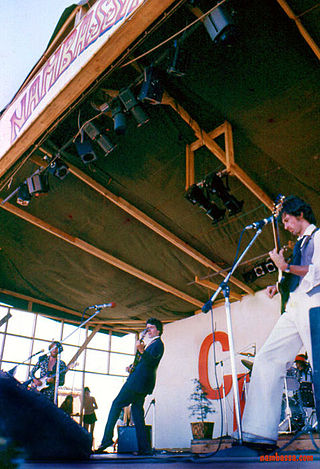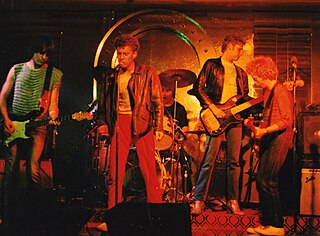Related Research Articles

Mount Smart Stadium is a multipurpose stadium in Auckland, New Zealand. It is the main home ground of the New Zealand Warriors of the National Rugby League, and occasionally hosts rugby union and international rugby league matches. Built within the quarried remnants of the Rarotonga / Mount Smart volcanic cone, it is located 10 kilometres south of the city centre, in the suburb of Penrose.

Citizen Band were a New Zealand band formed by the brothers Geoff and Mike Chunn, both of whom had previously been members of Split Enz.

Donald McGlashan is a New Zealand composer, singer and multi-instrumentalist who Is best known for membership in the bands Blam Blam Blam, The Front Lawn, and The Mutton Birds, before going solo. He has also composed for cinema and television. Among other instruments, McGlashan has played guitar, drums, euphonium and French horn.

Th' Dudes are a New Zealand rock band that was formed in the late 1970s in Auckland, New Zealand. Hits include "Walking in Light", "Right First Time", " Be Mine Tonight" and "Bliss".
Zed is a New Zealand pop rock group, which formed as Supra in 1996 in Christchurch by Ben Campbell on bass guitar, Nathan King on lead vocals and guitar, and Adrian Palmer on drums. In 2000 they added a second guitarist, Andrew Lynch. Their debut album, Silencer (2000), peaked at No. 1 on the New Zealand Albums Chart; while their second album, This Little Empire, reached No. 3. Their top 10 singles are "Glorafilia" (1999), "Renegade Fighter" (2000) and "Hard to Find Her" (2003). They toured New Zealand, Australia and United States before disbanding in 2004. They have reformed periodically including in 2017, 2019 and 2023.

Jan Hellriegel is a singer/songwriter based in Auckland, New Zealand.
Shayne P. Carter is a New Zealand musician best known for leading Straitjacket Fits from 1986 to 1994, and as the only permanent member of Dimmer (1995–2012).

Elemeno P is a New Zealand rock band. The band's first album, Love & Disrespect was released on 4 July 2003, and reached number one on the RIANZ albums chart. Their second album, Trouble in Paradise was released on 24 November 2005 and includes the singles "11:57", "Burn", "One Left Standing", and "You Are". Their third album, Elemeno P was released on 26 May 2008.
The Yandall Sisters were a popular New Zealand-born Samoan all-female singing group of the 1970s, who made a major contribution to music in New Zealand. The members of the group were Caroline, Mary and Adele Yandall, and later younger sister Pauline Yandall.

The Checks were a New Zealand rock band known for blues-driven, high-energy rock. The group released three albums, Hunting Whales, Alice by the Moon and Deadly Summer Sway and toured extensively before splitting up in 2012.
Deane Waretini is a musician from New Zealand. He had a #1 chart hit in 1981 with the song "The Bridge", a Māori language song set to Nini Rosso's tune "Il Silenzio". He is also the son of a historically significant Maori baritone singer and recording artist. In later years, Waretini was featured in a New Zealand television production that was built around him.

The Gluepot Tavern was a live music venue in Auckland, New Zealand. It closed in 1994.
RTC is a New Zealand record label which licensed recordings from overseas Independent labels in the United States and in the United Kingdom.
"The Bridge" was a #1 chart hit in 1981 for New Zealand singer Deane Waretini, and his backing group The Rising Stars. This also marked a first. It was the first Maori language record to hit the no 1 spot in New Zealand. "The Bridge" is an example of an artist in the 1980s contributing to the success of a record. This was done by kick starting the process in the beginning by self-financing the record, having a hand in its own promotion by employing various tactics to get the record heard by the public.

Waretini is an album by Deane Waretini which features his hit single "The Bridge".

Mandrill Studios was a recording studio in Parnell, a suburb of Auckland, New Zealand. Many of New Zealand's prominent artists have had their work recorded there.

The Mauri Hikitia is a various artists album released in 1981. It reached no 4 on the New Zealand charts. It features Rhonda, Ken Kincaid, Deane Waretini, and the Lightwood family.
The Quincy Conserve was a New Zealand group that were active from 1967 to 1975. Originating from Wellington, they were one of the biggest bands in the lower North Island.
Tony McCarthy Recordings was a New Zealand record label owned by record producer Tony McCarthy. Some of the artists on the label were Deane Waretini and Mahia Blackmore. The label is also a representation of the only released recordings by singer Abe Phillips who was killed in an accident in 1971.

20 Studio One Hits is a compilation album of New Zealand and New Zealand based artists culled from the Studio One television series on the N.Z.B.C. It was released in 1972. It was followed up by 20 Studio One Hits Volume 2 the following year. The albums are representative of the televised Studio One talent quests. Some of the songs that appeared on the album went on to become hits in Australasia. The records which were released on the Music for Leisure label are a historical account of the Studio One talent quests.
References
- 1 2 Audio Culture, 23 May 2013 The Radars, Profile - Adam Gifford
- 1 2 3 4 5 6 Central Leader, 22/01/2009 Former rocker's beat goes on
- 1 2 New Zealand Herald, Friday 1 December 2000 Range of the Radars covers entire town By Graham Reid
- ↑ New Zealand Herald, 5 November 1966 Blind pop group success
- 1 2 3 Sergent.com.au Radars
- ↑ Discogs The Radars (2) – Don't Get Around Much Anymore
- ↑ Timaru Herald, 29/04/2013 History of TV in NZ spliced together - Claire Allison
- ↑ Heritage New Zealand http://www.heritage.org.nz/the-list/details/7218, Gluepot Tavern
- ↑ New Zealand Herald , Friday 1 December 2000 Range of the Radars covers entire town by Graham Reid
- ↑ Perrott, Alan (30 March 2009). "You must remember this". New Zealand Herald.
- ↑ "Deane Waretini With The Rising Stars - Discography". 45cat.
- ↑ Perrott, Alan (30 March 2009). "You must remember this, Deane Waretini - The Bridge". New Zealand Herald.
- ↑ "Two members remain". Auckland Star. 18 February 1983.
- ↑ Stranded in Paradise: New Zealand Rock'n'roll, 1955–1988, by John Dix, Page 219, Page 294
- ↑ New Zealand Herald - Monday Mar 30, 2009 You must remember this, Deane Waretini - The Bridge - By Alan Perrott
- ↑ Charts.org.nz THE RADARS - THAT LUCKY OLD SUN (SONG)
- ↑ Charts.org.nz THE RADARS - BANANA BOAT SONG (SONG)
- ↑ Auckland Council Libraries Auckland - a meeting place for blind musicians
- ↑ Auckland Council Libraries Range of the Radars
- ↑ Scoop.co.nz, Tuesday, 28 November 2000 Largest gathering of blind musicians
- 1 2 "Radar Ray Lemon Plays Last Chord". Waatea 603 AM News. 18 July 2008.
- ↑ Eventfinda Blue Collar Band
- 1 2 PME Entertainment Agents 2 Flat Whites and a Mocha - Covers band - Auckland
- ↑ Eventfinda Blue Collar Band
- ↑ NZ Music Collection The Radars Singles Discography
- ↑ "Page 8 Profile of the "Rising Stars"". Auckland Star. 28 May 1975.
- ↑ "Index Auckland: local history, arts and music". Auckland City Libraries.
- ↑ "Artist: Deane Waretini With The Rising Stars, Catalogue: INN 009". 45cat.